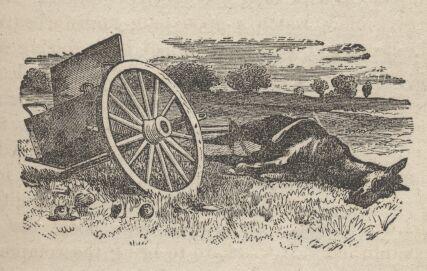Sources generally agree on the identity of Schell Creek, also known later as Schellbourne or Fort Schellboure. George Chorpenning and Howard Egan established a station at the site in late 1859, which served the Pony Express during its existence and the Overland Mail Company line until 1869. English traveler Richard Burton stopped at Schell Creek on October 5, 1860, and identified Francais de France Constant Dubail as stationkeeper at the bullet-scarred log structure. Several months earlier, on June 8, 1860, Indians attacked the station. According to one source, they scared away the station's residents and destroyed the building. Another source claims that Indians killed three people at the station before scattering the station's livestock.
After the Pony Express ended, the Overland Mail Company established its Utah-to-central Nevada district headquarters at Schell Creek in 1862-1863. Stone and log structures housed craftsmen who kept the coaches and other equipment in good repair, and the station compound grew into Fort Schellbourne, a town of 500 by the 1870s. Two log structures, as well as other buildings, remain from the old fort. Local belief suggests that one of them served as the Pony Express station, but no actual proof exists.
We resumed the descent along a fiumara, which presently sank, and at 5 PM halted in a prairillon somewhat beyond. Bunch grass, sage fuel, and water were abundant, but the place was favorable for an attack. It is a golden rule in an Indian country never to pitch near trees or rocks that can mask an approach, and we were breaking it in a place of danger. However, the fire was extinguished early so as to prevent its becoming a mark for Indians, and the pickets placed on both sides of the ravine were directed to lie motionless a little below the crest and to fire at the first comer. I need hardly say we were not murdured; the cold however was uncommonly piercing.
To Robber Roost, 5th October.
We set out at 6 AM the next morning, through a mixture of snow and hail and howling wind, to finish the ravine, which was in toto eight miles long. The descent led us to Spring Valley, a bulge in the mountains about eight miles broad, which a sharp divide separates from Shell Valley its neighbor. On the summit we fell into the line of rivulet which gives the low lands a name. At the foot of the descent we saw a woodman, and presently the station. Nothing could more want tidying than this log hut, which showed the bullet marks of a recent Indian attack. The master was a Francais de France, Constant Dubail, and an ex Lancier: his mother's gossip had received a remittance of 2,000 francs from a son in California, consequently he had torn himself from the sein of sa pauvre mere, and with three others had started in search of fortune, and had nearly starved. The express riders were three roughs, of whom one was a Mormon. We passed our time while the mules were at bait in visiting the springs. There is a cold creek 200 yards below the station, and close by the hut a warm rivulet, said to contain leeches. The American hirudo, however, has a serious defect in a leech - it will not bite; the faculty, therefore, are little addicted to hirudination; country doctors rarely keep the villainous bloodsuckers, and only the wealthy can afford the pernicious luxury, which, imported from Spain, costs $12 per dozen, somewhat the same price as oysters at Nijni Novgorod.
The weather, which was vile till 10 AM, when the glass showed 40 F, promised to amend, and as the filthy hole - still full of flies, despite the cold - offered no attraction, we set out at 2 PM for Egan's Station, beyond an ill omened kanyon of the same name. We descended into a valley by a regular slope, - in proportion as we leave distance between us and the Great Salt Lake the bench formation on this line becomes less distinct, - and traversed a barren plain by a heavy road. Hares and prairie hens seemed however to like it, and a frieze of willow thicket at the western end showed the presence of water. We in the ambulance halted at the mouth of the kanyon; the stock and the boys had fallen far behind, and the place had an exceedingly bad name. But the cold was intense, the shades of evening were closing in, so we made ready for action, looked to the priming of gun and revolver, and then en avant! After passing that kanyon we should exchange the land of the Gosh Yuta for those of the more friendly Shoshonee.
(The City of the Saints, p 466-7)
